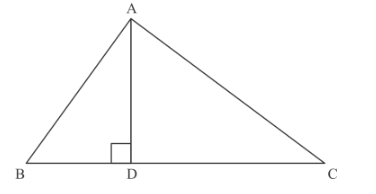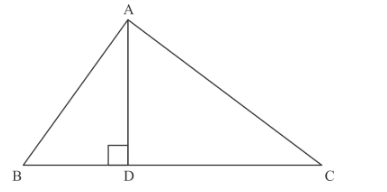In Fig. 6, $A D \perp B C$ and $B D=\frac{1}{3} C D$. Prove that $2 C A^{2}=2 A B^{2}+B C^{2}$

In the given figure, we have
$A D \perp B C$ and $B D=\frac{1}{3} C D$, then we have to prove $2 C A^{2}=2 A B^{2}+B C^{2}$
The following given diagram is

Now, suppose the value of BD is x, then
$B D=\frac{1}{3} C D$
$\Rightarrow \quad x=\frac{1}{3} C D$
$\Rightarrow C D=3 x$
$B C=B D+C D$
$=x+3 x$
$=4 x$
In triangle ADC, we have
$C A^{2}=C D^{2}+A D^{2} \ldots \ldots(1)$
And in triangle ADB, we have
$A B^{2}=B D^{2}+A D^{2}$
$\Rightarrow A D^{2}=A B^{2}-B D^{2} \ldots \ldots(2)$
Now add the equation (1) and equation (2), we get
$C A^{2}+A D^{2}=C D^{2}+A B^{2}-B D^{2}+\mathrm{AD}^{2}$
$\Rightarrow \quad C A^{2}=A B^{2}+C D^{2}-B D^{2}$.......(3)
Now we are putting the values of BD and CD, we get
$C A^{2}=A B^{2}+(3 x)^{2}-x^{2}$
$\Rightarrow \quad C A^{2}=A B^{2}+8 x^{2}$
$\Rightarrow \quad C A^{2}=A B^{2}+\frac{1}{2} \times(4 x)^{2}$
$\Rightarrow 2 C A^{2}=2 A B^{2}+B C^{2}$
Hence proved.
